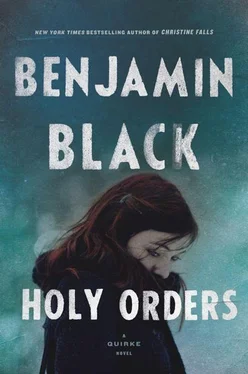It was Sally who was crying.
Phoebe closed the door and stood in the dimness, listening to her heart beating. What was she to do? The girl out there was a stranger, met for the first time today. She was crying for the death of her brother. That was her right, and it was not for anyone to interfere with her sorrow. She started back towards the bed, but stopped, and again stood listening. Sally must have her face pressed into the pillow, Phoebe thought, but the sounds she made were high-pitched and thin, and would not be stifled. What was it about the sound of someone weeping, Phoebe wondered, that caused that urgent, pulsing sensation in the chest? Did men feel it, too, or was it a reflex confined to women, something left over from the fire-lit caves of prehistoric times? It was not to be resisted. She turned back, and went through, into the living room.
The darkness was heavier here than in the bedroom — she had closed the heavy curtains earlier, and only the glow from the streetlight outside penetrated them. She moved to the sofa. Sally had gone silent, like an animal surprised in its lair. When Phoebe put out her hand she misjudged the distance, and her fingers touched the girl’s hair, and it was as if she had touched a gathered bundle of fine electric wires. “Sally,” she whispered, “are you all right?”
Sally’s dim form on the sofa stirred, and she lifted her face from the pillow and turned onto her side. “I’m sorry,” she said, her voice blurry. “Did I wake you?”
“No, no. I was awake. I wasn’t sure if I— Maybe I should have—”
“It’s all right,” Sally said, and sat up. “You’re kind, to worry about me.”
“Can I get you something—?”
Sally had lifted her knees under the sheet and now she pressed her forehead to them. “We were twins, you know,” she said.
For a second Phoebe, leaning in the darkness, did not understand. “What? You mean—?”
“Twins. James and I.”
“But you said he was older.”
Sally gave a mournful little laugh. “So he was — by two minutes.”
Now Phoebe knelt beside the sofa. “Why didn’t you say, before?”
“Oh, I don’t know. It was something I always felt strange about — so did James. We thought we were — freaks, in a way. Silly, I know.” She laughed and then snuffled. “I wonder if you have a hankie? I don’t know where my handbag is.”
“Shall I put on the light—?”
“No!” Sally cried. “I’m sure I look a mess. My nose turns into a Belisha beacon when I cry. That’s the trouble with being a redhead — one of the troubles.”
“There’s no need to be embarrassed. You’ve been through an awful experience.”
Phoebe hurried into the bedroom and found a clean and folded linen handkerchief in one of the drawers in the tallboy and brought it back and gave it to Sally.
“I promised myself I wouldn’t blubber,” Sally said ruefully. “And now look at me, waking up the house!”
“Let me switch on a lamp — we can’t keep whispering in the dark like this.”
“No, don’t please. I’m tired, I want to sleep. Can I keep the hankie?”
“Of course.”
With a last, loud snuffle Sally lay back and sank her head onto the pillow, sighing. Phoebe hovered over her, feeling there was something more she should do, something more she should say. But what? She never knew the right thing to do at moments of crisis and emotional turmoil, and words seemed always to fail her. It was, she suspected, another of the ways in which she resembled her father. They were both cripples of a kind. Or no, that was not true, not of her, anyway. In her heart she could sympathize, and when something affected her she could put herself in another’s place. It was just that she could not find the means to express this fellow feeling, and that failure made her mute.
Sally’s breathing was calm now, and she was either asleep or pretending to be. Phoebe turned away and crossed the room to the bedroom door and went through. She could still feel in the pads of her fingers the tingling afterglow of that shock she had experienced when she had touched Sally’s hair in the dark. It was going to be a long and sleepless night.
Quirke woke in a panic. His blood was pounding in his ears and he felt he was suffocating. He lay on his back, panting and drenched with sweat, pressing his fists down hard on his heaving chest, like those new defibrillator paddles that were being used nowadays to deliver electric shocks to people suffering a heart attack. This was not the usual morning onslaught of dread and dismay; this was something altogether different. It was as if a huge, malign creature had got hold of him and wrapped its immense arms around his ribs, squeezing the breath of life itself out of him.
He told himself to be calm, but the voice in his head that was telling him so seemed to belong not to him but to some disinterested other, someone who had been passing by and, seeing him in distress, had stopped to tend him, more out of curiosity than concern. He struggled to sit up. The sheet was a constricting tangle and he churned his legs, a fallen cyclist. He was in his undershirt and shorts. He felt at once ridiculous and horribly frightened. Rain was fingering the window and yet the sun was shining. Absurd season, he thought, and was immediately consoled a little: if he could complain to himself about so banal a thing as the weather then surely he was not dying.
At last he freed himself from the bedclothes and stood up, then quickly sat down again, his head spinning. He shut his eyes but that made the dizziness worse. His hands were clutching the edge of the mattress. Everything seemed about to tip over, as if he were sitting on the deck of a foundering ship. Then, gradually, his brain righted itself and he stood up again, more cautiously this time. He went to the wardrobe and searched in the pockets of his jacket hanging there and found his cigarette case. He had always liked the smell of mothballs. What was it they were made of? Camphor. Was that the word? He mumbled it aloud: “Camphor.” It did not sound right; it sounded like a nonsense word.
He went back and sat on the side of the bed again and lit a cigarette. The smoke smelled like singed hair.
Isabel — where was Isabel? She had been here in the night and now she was gone. Then he remembered that she had left in the early hours, had called a taxi and gone home. It was tacitly understood between them that on these occasions she would not stay the night; Quirke liked his mornings to himself.
He went out to the living room. A parallelogram of insipid sunlight lay on the floor under the window like the parts of a broken kite. He stood and looked about himself, feeling dazed. The morning’s watercolor tints lent a novel sheen to familiar surfaces. Everything was as it always was, yet somehow he could recognize nothing. It was as if all that was formerly here had been swept away in the night and replaced with a shiny new version of itself, identical in every aspect, yet one-dimensional and hollow, like props in a fantastically detailed stage setting.
He walked into the kitchen and saw Isabel sitting at the table in a haze of cigarette smoke, wearing a dark blue dress and high heels, drinking a cup of coffee and smoking a cigarette. The silky stuff of her dress had a metallic glitter that hurt his eyes; he shut them for a second, and when he opened them again no one was there. I’m seeing things, he thought. The commonplace phrase, trite and harmless, had never before struck such fear into his heart.
He took extra care shaving that morning. His hand was steady enough, but that was more than could be said for his thoughts. A small fuzzy something lay at the center of his consciousness, an unfocused point that seemed to be throbbing in time with his pulse. Everything around him had a discolored look, the bathroom shelves, the shaving mirror, the porcelain sink — the very air in the room, as if a heavy gas had seeped out of the walls and spread itself everywhere. He knew from experience how certain dreams, weighty and disordered, could infect the waking world for hours, sometimes for days. But had he been dreaming? On the way from the bathroom he stopped in the kitchen doorway again and looked at the table where half an hour ago he could have sworn he had seen Isabel sitting, smiling at him. Everything about the scene had seemed solid, and real, even the incongruously formal outfit the phantom woman had been wearing.
Читать дальше












